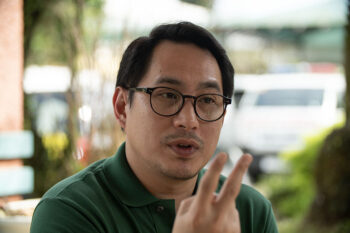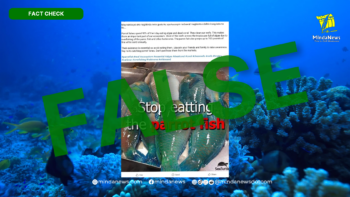GENERAL SANTOS CITY (MindaNews/31 March)– Thirteen days after Pope Benedict XVI had resigned from the papacy, Pope Francis was elected on March 13, 2013 eleven days before Palm Sunday that ushers in the Holy Week. It is unthinkable for the Roman Catholic Church to be without a Pope during Holy Week and Easter Sunday. Normally, the election of the Pope is a happy occasion in the life of the Church.
As Pope Francis sends his Easter Greetings to the 1.2 billion Catholics as well as to all other Christians and other people of all religions; and as Catholics greet each other “Happy Easter”, a question intrudes: Will the Catholic Church be happy throughout the Papacy of Pope Francis?
The question sounds naïve. Reports about Pope Francis during the two weeks of his papacy are full of “notes” and “quotes” indicating that as his election was a surprise, his papacy will be full of surprises – fulfillment, satisfaction, disappointment. He joked the Cardinals “May God forgive you for electing me.” Some of them, if not many, may later find that to be more than a joke.
Now a Sensation
John L. Allen Jr. of the National Catholic Daily Reporter summed up the first ten days of Pope Francis, thus:
“… Polling around the world suggests that overwhelming majorities have a positive impression of the new pope, and the media have fallen in love with a man who packs his own bags, makes his own calls and prefers to walk rather than taking the limo.
“Everything Francis does, however banal, is now a sensation. The fact that TV cameras caught him checking his watch near the end of Tuesday’s inaugural Mass, for instance, launched an essay in one of the Italian papers about his pastoral concern for not holding people too long for an overly elaborate liturgy.
“The new papal style certainly has registered with his underlings. … I bumped into a cardinal who’s a veteran insider now over 80. When I noted he was dressed in his basic clergyman clothes rather than the usual finery, he smilingly said he was taking his cues from the new boss.”
Pope Francis impresses the Vatican and the world with his humility, simplicity, frugality and rapport with the media and the people. Just a few notes: Minutes after his election he declined wearing the traditional ceremonial red velvet cape trimmed with ermine and red shoes for his ceremonial introduction to the throng at St. Peter’s Square and the world; instead, he wore white cassock of the papacy, white skull-cap, black shoes and his pastoral cross which now he prefers to wear, not the papal golden pectoral cross.
Incognito, he took a car to visit a Roman basilica dedicated to the Virgin Mary in Rome and to pick his luggage and pay his bill at the Vatican-owned hotel where the Cardinals stayed before the Conclave. He stood on the same level with the Cardinals, not on an elevated platform, in receiving their pledge of obedience and greeting them marked with familiarity like some jokes.
He shortened and simplified the inaugural Mass. He kissed babies and personally went to a disabled man to bless him. He met the Vatican-accredited journalists numbering thousands talking to them in “simple, easy to understand terms about ethical values” and showing “remarkable sense of humour”. He had a scavenger from Buenos Aires for a special guest, attending to him ahead of dignitaries. He personally called a Vatican receptionist to connect him to the Jesuit Superior General instead of asking an office staff to make the request – the receptionist mistaking it for a prank.
He finds the papal apartment at the top floor of the Apostolic Palace too luxurious. A CNN report dated March 28 said he had not yet transferred there – noting no time when he will or if he will. The biggest shock – not just a surprise – will be if he decides to cook his own meals as he used to do in Buenos Aires.
There are more “notes” and “quotes”, not just amusing but hints of changes to come.
Breaking from Traditions
On Maundy Thursday, Pope Francis broke the tradition in performing the centuries old rite, the washing of the feet. Before the Last Supper, Jesus washed, wiped and kissed the feet of his twelve apostles. Priests, bishops and the Pope only washed the feet of men – in the case of the Pope, only of priests and at either the St. Peter’s Basilica or the Basilica of St. John Lateran. Pope Francis disregarded this tradition.
First, he traveled outside the Vatican to the Casal del Marmo detention center for young offenders in the outskirts of Rome and celebrated Mass with them. The center holds 50 detainees aged 14 to 21.
Second, he chose 12 out of the 50 – two of them Muslims, boy and girl – for the ritual. Of the 12, two were girls, an Italian Catholic and that Muslim girl from Serbia.
Francis has called for “intensified dialogue with Islam” and in Good Friday prayers during the procession at the Colosseum, he praised “the friendship of our Muslim brothers and sisters”. The Associated Press wrote: This has rubbed “the traditionalists the wrong way” and Thursday’s washing of the feet ritual has heightened the fear of traditionalists that the revival of pre-Vatican II Church traditions under Pope Benedict XVI will be disregarded.
Cardinal Jorge Mario Bergoglio, as Archbishop of Buenos Aires, was controversial; as Pope Francis, he has brought the controversies to the Vatican and is creating more controversies with the traditionalists whose displeasure behind low-tone conciliatory remarks and responses cannot be ignored. He looks incorrigible! Doesn’t he?
Style to Substance
Allen, after summing up his impression of Pope Francis’ first ten days, stated:
“As soon as Holy Week wraps up, however, the focus will shift from style to substance. Hard questions will begin to be asked about whether he’s capable of delivering the reform in the Vatican that many cardinals believed they were voting for in electing him.”
This is the meat of his article, “Five tests of whether Pope Francis’ reform of the Vatican could be real”, in the National Catholic Reporter, March 22, 2013. What are the five tests?
Who will he appoint as the Secretary of State of the Vatican? One who must sort out the mess of governance in the city state. He can pick from archbishops and cardinals experienced in the Vatican bureaucracy. But “he could reach into the ranks of diocesan bishops and find someone with a proven record as an administrator … Whomever he chooses, it will speak volumes to those with eyes to see about how much change is likely and how quickly it may come.”
How will he resolve the controversy over the Vatican Bank or Institute for Works of Religion? Will he transfer its management to the Vatican City State or have it retained within the Holy See? The bank with a $6-billion asset, a special bank for diocese, religious orders and Catholic organizations, does not function as a regular bank do but has been questioned by the Council of European anti-laundering agency about its “lack of external regulation”.
The so-called “Vatileaks” – or the leaking of “secret dossiers “ – raised some “major questions hanging” that call for “convincing answers” but which the Vatican seems unwilling to provide. The willingness to “will likely be seen as a major test of whether there truly is a new standard of transparency under Pope Francis”.
Will he be able to end the sex abuse crisis? Pope John Paul II and Pope Benedict XVI failed to even if they had addressed it in earnest. Under Pope Benedict, the policy is “zero tolerance” for priest abusers” but not for bishops who mishandle abuse complaints. The test for Pope Francis: Will he hold the bishops accountable?
Reporters must have equal access to information about the activities of the Pope. Can the papal spokesman make this happen? Can Pope Francis “make himself available to the press on a more regular and less scripted basis than heretofore been the case”? Can he “encourage his deputies to do the same?
More on Major Issues
“Pope Francis takes the helm at a difficult time for the Catholic Church,” writes Michael Hirst in BBC News (March 14, 2013: The Pope’s inbox: Top priorities for Benedict’s successor). He discusses what he sees as “major issues” like what other critics see making references to authorities on the issues:
Managing the Vatican. “The Church’s central government – the Curia – [is] a seriously dysfunctional institution”. This the “recent leaking of Vatican documents by the Pope’s butler” has exposed. As seen by the veteran Vatican analyst Clifford Longley, the Curia appears to be “riddled with rival factions and accusations of corruption in high places. Decentralisation is now imperative. [Pope Francis] has a huge and unenviable task.”
What must be done? Systems of oversight need to be put in place to ensure corruption is detected and halted, while Vatican financial transactions need to be made more transparent.
Equality laws. This is about “the growing pressure on Catholics because of equality laws in the West,” citing the Catholic commentator Austen Ivereigh. “Gay marriage legislation in France and the UK, the closure of Catholic adoption agencies in the UK, the battle in US courts between leading Catholic institutions and the State over sexual equality are all serving to have a chilling effect on the Church in the West.”
What is the ultimate effect, according to Mr. Ivereigh: “The State could be developing positions through equality legislation that will serve to marginalise Catholics and the presence of the Church in public life.”
Sex Abuse. Benedict XVI has spoken of the Church’s shame for “unspeakable crimes” committed by paedophile priests, as well as offering heartfelt apologies to victims, groups of whom he has met during his trips overseas. But many critics feel the Vatican was – and still is – far too slow, too reluctant and too secretive when it comes to acknowledging and investigating sexual abuse.
The new Pope will have the task of continuing to ensure perpetrators are held to account, and to ensure the changes introduced by Benedict XVI are implemented – particularly when it comes to bishops signing up to child protection guidelines.
The role of women. This concerns the slow “progress on promoting women within the Church – particularly in its administrative bodies”, and as noted, the respect of women’s views “challenging the Church teachings”. They play “an active role within the context of Jesus’s mission” which, it is noted, has not been well appreciated.
What is expected of Pope Francis? He should let “a culture shift … take place within the Vatican, and … promote women into senior management positions in the Curia”. And, as well noted, views of women on Church dogmas and doctrines, like those of the pro-reform nuns in the US “on homosexuality and the male-only priesthood” should be heard and respected instead of being rebuked and investigated for “doctrinal errors”.
Interfaith tensions. This pertains to the relation of the Catholic Church particularly with the Muslims, Jews and the Anglicans. The major issue for Pope Francis is the “welfare of persecuted Christians around the world, particularly in troubled areas of the Middle East, Asia and Africa”. This exodus of Christians from the Holy Land will complicate the issue and “add significance to the Pope’s approach to relations with Jews and Muslims”.
“In general, relations with Anglicans and Jews seem to be on a good footing. But the new Pope will have to tread carefully to build bridges with the Muslim world while not alienating Jews and without being seen to pander to Islamic extremism.”
Smaller congregations, fewer priests. The state of Catholicism in Argentina is typical of the state of Catholicism in Europe, the Americas, Asia, etc.; that is, declining number and declining faith. In Argentina, 78 percent of the population is nominally Catholic, down from what used to be 90 percent. Only 33 percent consider religion important in life, down from 40 percent in 2000; 19 percent are regular Mass goers.
“However, Pope Benedict XVI seemed reasonably untroubled by this numerical decline, envisioning a smaller, but more faithful, Church. To consolidate this changing position … within society, … the Church will have to ensure that those within the pews – and those who lead them – are well supported.”
As Pope Benedict XVI did, Pope Francis is expected to continue taking advantage of modern technology and modern communications strategy to aid decision-making and to spread the Church message of evangelization. Pope Benedict took to Twitter. Will Pope Francis do the same enthusiastically?
Wait and See
From the “notes” and “quotes”, we see Pope Francis as distinctly different from his predecessors. He was elected to reform the Catholic Church and apparently as a dark horse between the conservative and liberal cardinals. He has the stuff to do reforms.
Will he be able to meet expectations? This is a thorny question. Expectations radically differ even among those who elected him to do reforms. Certainly, he has his own vision for the Church. He will surely do unexpected reforms.
He has repeatedly invoked “poor Church for the poor”. What does he really mean by this? Certainly, not stripping the Church of her wealth – like selling the art collections of the Vatican, as someone has suggested – to be given to the poor. As seen by one writer, Fr. Dwight Longenecke, he cannot rely for support from the wealthy who admire “his gestures toward the Franciscan ideal of poverty”; they will abandon him once their wealth gets counted.
Does “poor Church” refer to the generally poor laity? Does “poor Church for the poor” mean strengthening the dioceses to help the poor? Giving the dioceses more autonomy is not among the major issues raised. But it would not be a surprise if this will be among Pope Francis’ major reforms given his pastoral orientation.
What Pope Francis will do within the next six months or year will be interesting to watch. That will define his papacy. He will not act alone. He asked the faithful: “Pray for me!”
(“Comment” is Mr. Patricio P. Diaz’ column for MindaViews, the opinion section of MindaNews. The Titus Brandsma Media Awards honored Mr. Diaz with a “Lifetime Achievement Award” for his “commitment to education and public information to Mindanawons as Journalist, Educator and Peace Advocate.” You can reach him at patpdiazgsc@yahoo.com.)







